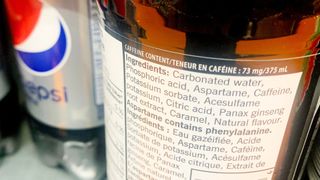
Reuters reported that an arm of the World Health Organization will soon name aspartame a “possible carcinogen.”
(Image credit: Steve Russell / Contributor via Getty Images)
An agency within the World Health Organization (WHO) will soon name the widely used artificial sweetener aspartame a “possible carcinogen,” based on a review of 1,300 studies, Reuters reported, citing information from two sources who are knowledgeable about the process.
But don’t panic: The arm of the WHO that did the review, the International Agency for Research on Cancer (IARC), uses a classification system for possible and known carcinogens that is notoriously confusing and often misleading, Reuters noted. Science writer Ed Yong summed it up well in a 2015 Atlantic article, in which he wrote, “Perhaps we need a separate classification scheme for scientific organizations that are ‘confusogenic to humans.'”
Here’s what you need to know.
Problems with the IARC’s rulings
The IARC doesn’t analyze how much of a product a person can safely consume before it poses a health risk, according to Reuters. When it comes to aspartame, the answer is a lot: Past assessments suggest that a typical, 150-pound (68 kilograms) person could safely consume the equivalent of the aspartame contained in more than 13 cans of Diet Coke a day.
Related: Non-sugar sweeteners don’t help with weight loss and may come with health risks, WHO says
The arm of the WHO that handles such assessments — the Joint WHO and Food and Agriculture Organization’s Expert Committee on Food Additives, or JECFA — has ruled on aspartame many times before. In its most recent review, the agency again held that the sweetener is safe to consume and set the acceptable daily intake at zero to 40 milligrams per 2.2 pounds (1 kilogram) of body weight. That translates to about 2,730 milligrams per day for a 150-pound person.
Again, this recommendation reflects how much aspartame can be consumed before it poses any health risk — not specifically cancer. Various agencies, including the European Food Safety Authority and U.S. Food and Drug Administration, have not found any definitive link between aspartame consumption and an increased risk of cancer, the American Cancer Society states.
Interestingly, JECFA is also reviewing the available data on aspartame and will announce its findings July 14, the same day the IARC is expected to rule on the artificial sweetener.
The IARC ranks substances as carcinogenic, probably carcinogenic, possibly carcinogenic or not classifiable. These classifications serve as a rough way to rank the strength of the evidence linking a substance to cancer in humans; this evidence includes studies of humans, human cells and tissues and lab animals, as well as studies of the substances’ similarity to known or probable carcinogens. The rankings aren’t related to how much a substance might increase cancer risk, but how conclusively the IARC can say it causes cancer at all.
Tobacco, asbestos and processed meat are all classified as carcinogenic, meaning the IARC determined there’s conclusive evidence that they can cause cancer in humans, even though the degree of risk differs among these substances.
The IARC considers glyphosate, the active ingredient in the weed killer Roundup, a “probable” carcinogen, meaning there’s inconclusive or inadequate evidence that it can cause cancer in humans and either sufficient evidence showing it causes cancer in animals or strong evidence that it has similar characteristics to known or probable human carcinogens. (Regulatory agencies have contested the IARC’s ruling on glyphosate, Reuters noted.)
For “possible” carcinogens, there’s inconclusive or inadequate evidence they can cause cancer in humans but sufficient evidence that they cause cancer in animals or strong evidence that they have carcinogen-like characteristics. In some cases, something can rank as a possible carcinogen if there’s “strong” evidence from cell and chemical studies but inadequate evidence in animals and humans.
Sources told Reuters that aspartame will fall into this category, alongside the radiofrequency electromagnetic fields associated with cellphones. (Note that non-IARC authorities have said there’s no or insufficient evidence linking cancer to cellphone use.)
Listing aspartame as a possible carcinogen is intended to motivate more research, sources close to the IARC told Reuters. Read more about the IARC’s upcoming decision in Reuters.
Stay up to date on the latest science news by signing up for our Essentials newsletter.
Nicoletta Lanese is the health channel editor at Live Science and was previously a news editor and staff writer at the site. She holds a graduate certificate in science communication from UC Santa Cruz and degrees in neuroscience and dance from the University of Florida. Her work has appeared in The Scientist, Science News, the Mercury News, Mongabay and Stanford Medicine Magazine, among other outlets. Based in NYC, she also remains heavily involved in dance and performs in local choreographers’ work.
>>> Read full article>>>
Copyright for syndicated content belongs to the linked Source : Live Science – https://www.livescience.com/health/food-diet/aspartame-to-be-declared-possible-carcinogen-by-who-dont-panic










